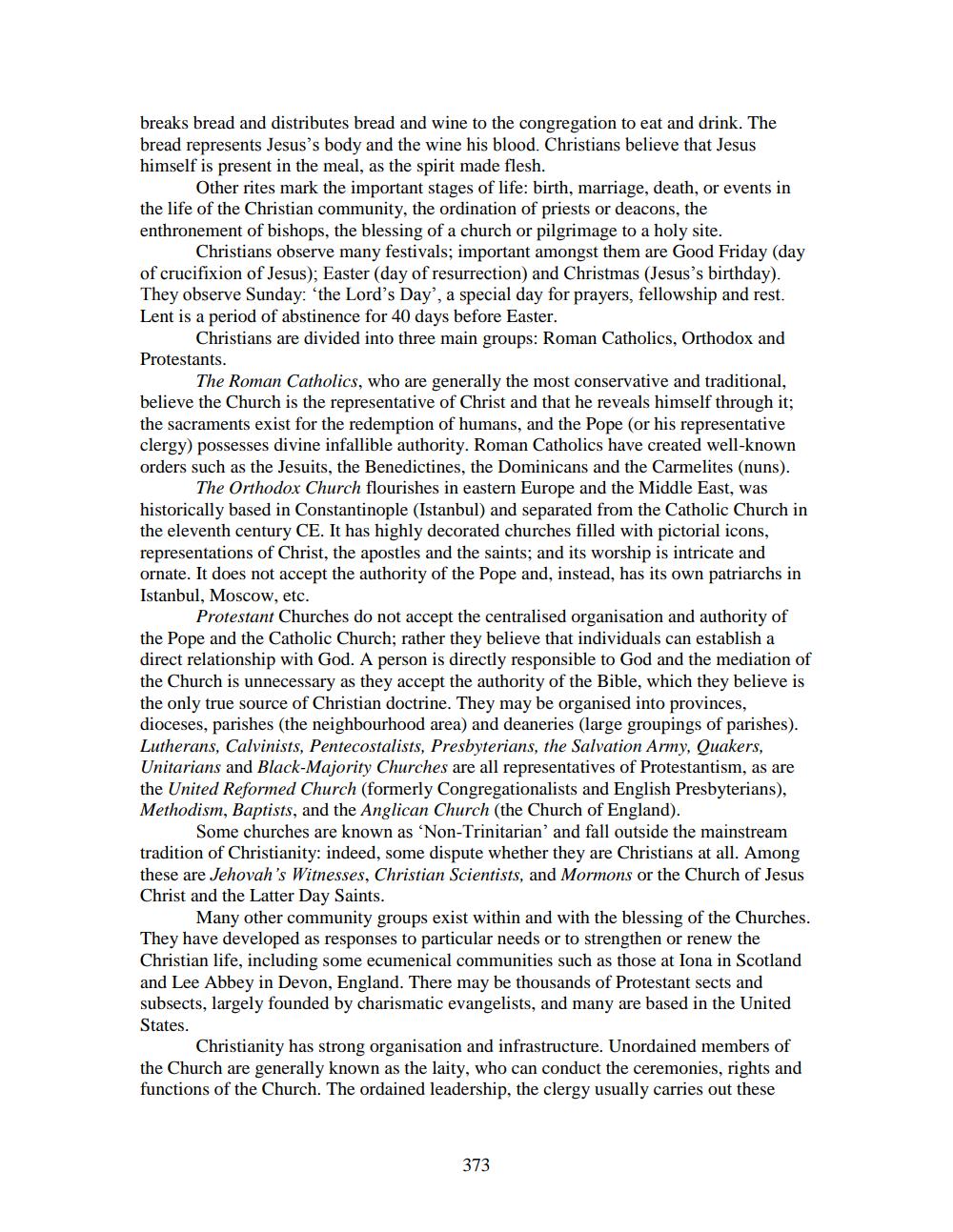________________
breaks bread and distributes bread and wine to the congregation to eat and drink. The bread represents Jesus's body and the wine his blood. Christians believe that Jesus himself is present in the meal, as the spirit made flesh.
Other rites mark the important stages of life: birth, marriage, death, or events in the life of the Christian community, the ordination of priests or deacons, the enthronement of bishops, the blessing of a church or pilgrimage to a holy site.
Christians observe many festivals; important amongst them are Good Friday (day of crucifixion of Jesus); Easter (day of resurrection) and Christmas (Jesus's birthday). They observe Sunday: 'the Lord's Day', a special day for prayers, fellowship and rest. Lent is a period of abstinence for 40 days before Easter.
Christians are divided into three main groups: Roman Catholics, Orthodox and Protestants.
The Roman Catholics, who are generally the most conservative and traditional, believe the Church is the representative of Christ and that he reveals himself through it; the sacraments exist for the redemption of humans, and the Pope (or his representative clergy) possesses divine infallible authority. Roman Catholics have created well-known orders such as the Jesuits, the Benedictines, the Dominicans and the Carmelites (nuns).
The Orthodox Church flourishes in eastern Europe and the Middle East, was historically based in Constantinople (Istanbul) and separated from the Catholic Church in the eleventh century CE. It has highly decorated churches filled with pictorial icons, representations of Christ, the apostles and the saints; and its worship is intricate and ornate. It does not accept the authority of the Pope and, instead, has its own patriarchs in Istanbul, Moscow, etc.
Protestant Churches do not accept the centralised organisation and authority of the Pope and the Catholic Church; rather they believe that individuals can establish a direct relationship with God. A person is directly responsible to God and the mediation of the Church is unnecessary as they accept the authority of the Bible, which they believe is the only true source of Christian doctrine. They may be organised into provinces, dioceses, parishes (the neighbourhood area) and deaneries (large groupings of parishes). Lutherans, Calvinists, Pentecostalists, Presbyterians, the Salvation Army, Quakers, Unitarians and Black-Majority Churches are all representatives of Protestantism, as are the United Reformed Church (formerly Congregationalists and English Presbyterians), Methodism, Baptists, and the Anglican Church (the Church of England).
Some churches are known as 'Non-Trinitarian' and fall outside the mainstream tradition of Christianity: indeed, some dispute whether they are Christians at all. Among these are Jehovah's Witnesses, Christian Scientists, and Mormons or the Church of Jesus Christ and the Latter Day Saints.
Many other community groups exist within and with the blessing of the Churches. They have developed as responses to particular needs or to strengthen or renew the Christian life, including some ecumenical communities such as those at Iona in Scotland and Lee Abbey in Devon, England. There may be thousands of Protestant sects and subsects, largely founded by charismatic evangelists, and many are based in the United States.
Christianity has strong organisation and infrastructure. Unordained members of the Church are generally known as the laity, who can conduct the ceremonies, rights and functions of the Church. The ordained leadership, the clergy usually carries out these
373




